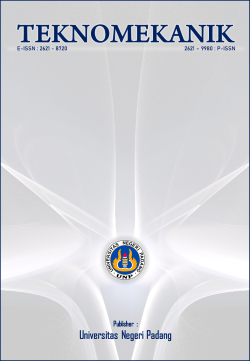Efforts to improve problem solving skills and critical thinking skills through problem-based integrated Computer Assisted Instruction (CAI) in Vocational Education
DOI:
https://doi.org/10.24036/jptk.v4i2.21123Keywords:
Problem solving skill, Critical thinking skills, Computer Assisted Instruction, Problem-basedAbstract
Based on research conducted by PISA, the ability to solve problems and think critically of Indonesian students is still below the average score set by PISA. Problem based learning is one of the learning models recommended by the Ministry of Education and Culture to be applied in improving these abilities. However, the lack of problem-based learning that has been applied so far is the lack of use of media that can be used as support in learning activities, resulting in inconsistencies in the impact of problem-based learning in improving student skills. The importance of these skills for students to have in this era of the industrial revolution 4.0, makes educators have to be more creative and innovative in implementing learning. Therefore, this study aims at seeing efforts to improve problem solving skills and critical thinking skills through problem based integrated computer assisted instruction (CAI). This study used a quasi-experimental pre-test and post-test control group design. The population in this study were undergraduate students of Mechanical Engineering Education, Padang State University. The instrument used in this research is a questionnaire which is used to see students' problem solving and critical thinking skills. The data analysis technique in this study is in accordance with the research hypothesis, where research hypotheses 1 and 2 use independent sample t-test and research hypothesis 3 uses MANCOVA. The research covered by his study is in line with higher education's continuing search for effective SCL approaches
Downloads
References
Anderson, J. C. (2007). Effect of Problem Based Learning on Knowledge Acquisition, Knowledge Retention and Critical Thinking Ability of Agricultural Students in Urban Schools. University of Missouri.
Black, T. R. (1999). Doing Quantitative Research in the Social Sciences: An integrated approach to research design, measurement and statistic. Sage Publication.
Budak, E. Ç., Topal, A. D., & Geçer, A. K. (2018). Developing the Scale of Problem-Solving Skills for Secondary School-Aged Deaf and Hard of Hearing Students. 3(1), 1–8.
Burris, S. (2005). Effects of Problem Based Learning on Critical Thinking Ability and Content Knowledge of Secondary Agriculture. University of Missouri.
Camphbell, D. T., & Stanley, J. C. (1963). Experimental and Quasi-Experimental Designs for Research. Houghton Mifflin Company.
Chang, E. C., D ’Zurilla, T. J., & Sanna, L. J. (2004). Social problem solving: Theory research, and training. American Psychol- logical Association.
Christensen, L. B. (2001). Experimental Methodology. 8th ed. Allyn and Bacon.
Depdiknas. (2002). Kurikulum Berbasis Kompetensi SLTP Pedoman Umum. Direktorat Jenderal Pendidikan Dasar dan Menengah.
di Gropello, E., Kruse, A., & Tandon, P. (2011). Skills for the Labor Market in Indonesia. https://doi.org/10.1596/978-0-8213-8614-9
Erol, S., Jäger, A., Hold, P., Ott, K., & Sihn, W. (2016). Tangible Industry 4. 0: a scenario-based approach to learning for the future of production. Procedia CIRP, 54, 13–18.
Foster, N. L., Rawson, K. A., & Dunlosky, J. (2017). Self-regulated learning of principle-based concepts: Do students prefer worked examples, faded examples, or problem solving? Learning and Instruction, 1–7.
Hmelo-Silver, C. E. (2004). Problem-based learning: What and how do students learn? Educational Psychology Review, 16(3), 235–266. https://doi.org/https://doi.org/10.1023/B:EDPR.0000034022.16470.f3
Jaschke, S. (2015). Mobile learning applications for technical vocational and engineering education: The use of competence snippets in laboratory courses and industry 4.0. Proceedings of 2014 International Conference on Interactive Collaborative Learning, ICL 2014, December, 605–608. https://doi.org/10.1109/ICL.2014.7017840
Jose, R. (2016). Research Papers Requisite for Honing the Problem-Solving Skill. 10(1).
Lee, J., Kao, H., & Yang, S. (2014). Service innovation and smart analytics for Industry 4. 0 and big data environment. Procedia CIRP, 16, 3–8.
Lohr, S. L. (2010). Sampling: Design and Analysis, 2nd. Ed. Cengage Learning.
Nuha, M. A. (2016). Integrasi Teknologi Dalam Problem Based Learning Untuk Meningkatkan Kemampuan Pemecahan Masalah Siswa. Seminar Nasional Matematika X Universitas Negeri Semarang, 146–150.
OECD. (2013). PISA 2012 Results in Focus.
Özen, Y. (2016). Can I Solve the Problem? A Program Trail on Problem Solving Skill. 4(1), 1–10. https://doi.org/https://doi.org/10.12691/ajap-4-1-1
Peter, E. E. (2012). Critical Thinking: Essence for Teachiing Mathematics and Mathematics Problem Solving Skill. African Journal of Mathematics and Computer Science Research, 5(3), 39–43.
Rubin, A., & Babbie, E. (2010). Essential Research Methods for Social Work,2 . Ed. Cengage Learning.
Savin-Baden, M. (2016). The Impact of Transdisciplinary Threshold Concepts on Student Engagement in Problem-Based Learning: A Conceptual Synthesis. Interdisciplinary Journal of Problem-Based Learning, 10(2), 9–13. https://doi.org/https://doi.org/10.7771/1541-5015.1588
Ulger, K. (2018). The Effect of Problem-Based Learning on the Creative Thinking and Critical Thinking Disposition of Students in Visual Arts Education. Interdisciplinary Journal of Problem-Based Learning, 12(1), 3–6.
Wee, L. K.-N., Alexandria, M., Kek, Y.-C., & Kelley, C. A. (2003). Transforming the Marketing Curriculum Using Problem-Based Learning: A Case Study. Journal of Marketing Education, 25(2), 150–162. https://doi.org/https://doi.org/10.1177/0273475303254016
Wismath, S., Orr, D., & Mackay, B. (2015). Threshold Concepts in the Development of Problem-solving Skills. Teaching & Learning Inquiry, 3(1), 1–8.
Woods, D. R., Kourti, T., Wood, P. E., Sheardown, H., Crowe, C. M., & Dickson, J. M. (2001). Assessing problem-solving skills: Part I. The context for assessment. Chemical Engineering Education, 35(4), 300–307.
Woods, Donald R., Kourti, T., Wood, P. E., Sheardown, H., Crowe, C. M., & Dickson, J. M. (2002). Assessing problem-solving skills part 2: Assessing the process of problem solving. Chemical Engineering Education, 36(1), 60–67.
Yalcin, B. (2006). Short-term Effects of Problem –based Learning curriculum on Students’ Self-directed Skills Development. Croat Med J., 47(491), 1–8.
Downloads
Published
Issue
Section
License
Copyright (c) 2021 Rizky Ema Wulansari, Rahmat Azis Nabawi

This work is licensed under a Creative Commons Attribution 4.0 International License.





